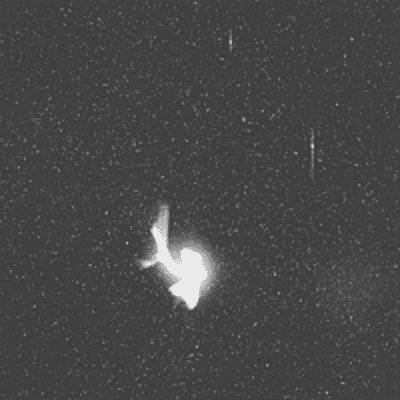
|
Credit & Copyright: ROTSE Team
Explanation:
Tonight, a lucky few may see a meteor explode.
Over the next 36 hours the Earth will pass unusually
close to debris expelled from
Comet Tempel-Tuttle,
causing many sand-sized particles from this comet
to enter and burn up in the Earth's atmosphere.
This yearly
phenomenon is known as the
Leonids Meteor Shower, but the location
the Earth passes through this year holds
promise to provide particularly high activity.
The 1998 Leonids
was noteworthy for its many bright meteors.
In the
above slow-loading sequence, a 1998
Leonid was caught
exploding over Los Alamos, New Mexico.
In the last one-minute exposure,
another Leonid streaks past.
If tonight is clear, just grab a lawn chair
and a warm jacket, go outside, and
look up!
|
January February March April May June July August September October November December |
| ||||||||||||||||||||||||||||||||||||||||||||||||
NASA Web Site Statements, Warnings, and Disclaimers
NASA Official: Jay Norris. Specific rights apply.
A service of: LHEA at NASA / GSFC
& Michigan Tech. U.
Based on Astronomy Picture
Of the Day
Publications with keywords: Leonids - meteor
Publications with words: Leonids - meteor
See also:
- APOD: 2025 August 25 Á The Meteor and the Star Cluster
- APOD: 2025 August 6 Á Meteor before Galaxy
- APOD: 2024 November 27 Á The Meteor and the Comet
- Meteor over the Bay of Naples
- Fireball over Iceland
- APOD: 2023 August 23 Á The Meteor and the Galaxy
- APOD: 2023 July 16 Á Meteor and Milky Way over the Alps
